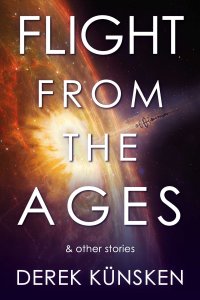Tom Whitmore Reviews The Grand Dark by Richard Kadrey
 The Grand Dark, Richard Kadrey (Harper Voyager 978-0-06-267249-0 $26.99, 419 pp, hc) June 2019.
The Grand Dark, Richard Kadrey (Harper Voyager 978-0-06-267249-0 $26.99, 419 pp, hc) June 2019.
Richard Kadrey’s new novel is a departure from his usual contemporary-setting dark fantasies, or maybe not. Set in a SF version of a middle-European city (Lower Proszawa) after one war has finished, where everyone knows that a new one is on the way, it has the feeling of an alternate world that is very close to our own, though much of the technology is further along than ours: self-driving vehicles, genetic modification, and animatronic theaters exist beside bicycles, slums, and political intrigue. Socially, this is a world we could get to. It’s a very strong depiction of William Gibson’s comment that “The future is here: it’s just not evenly distributed.” Against this backdrop, Largo, a bicycle-riding delivery person, finds himself drawn into horrendous deeds while trying to make a living, see his girlfriend (a performer in a grand guignol puppet-theater where the puppets are human-sized and controlled by actors in animatronic suits), and maybe find his way out of the slums.
As usual, Kadrey writes strongly from a punk perspective: drugs, sex, and a bleak city in the period between two wars leave the characters low-energy and just this side of clinically depressed. Largo, the protagonist, rises above this a bit: his job as a messenger has taught him all the ways to get around the city, and he actually manages to want several things during the course of the book. Of course, this being a punk novel, he loses each of them, sometimes in spectacular ways but more often through no fault of his own.
The bleakness and despair of the city is not overblown – even at its most gruesome, Largo acts more as a witness than as a participant, so I was never overwhelmed by the gore. And the characters all act believably in their extreme circumstances. This book is being compared in several places to China Miéville’s Perdido Street Station, and it’s an apt comparison. Where Miéville transcends his setting with an amazing Big Bad, however, Kadrey concentrates on the venality of human evil. It’s still a satisfying read.
This review and more like it in the September 2019 issue of Locus.
 While you are here, please take a moment to support Locus with a one-time or recurring donation. We rely on reader donations to keep the magazine and site going, and would like to keep the site paywall free, but WE NEED YOUR FINANCIAL SUPPORT to continue quality coverage of the science fiction and fantasy field.
While you are here, please take a moment to support Locus with a one-time or recurring donation. We rely on reader donations to keep the magazine and site going, and would like to keep the site paywall free, but WE NEED YOUR FINANCIAL SUPPORT to continue quality coverage of the science fiction and fantasy field.







